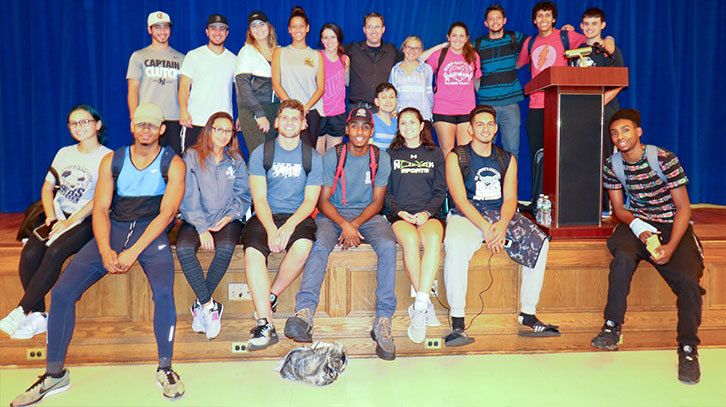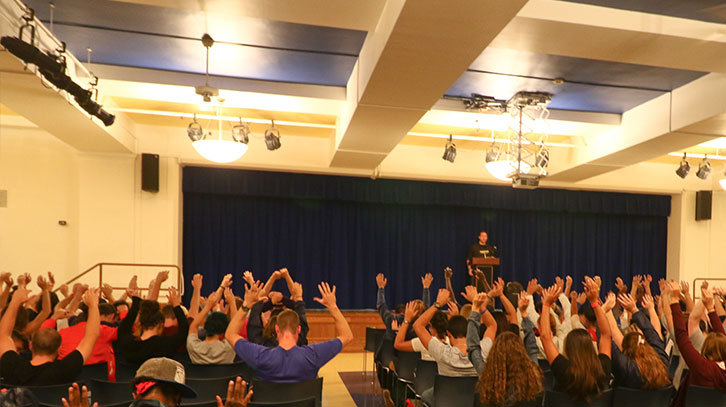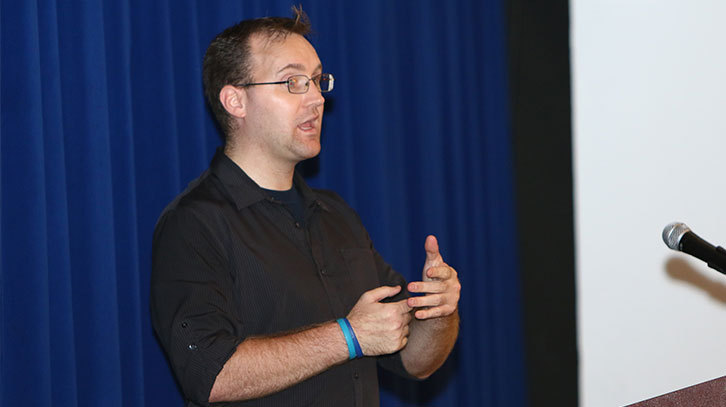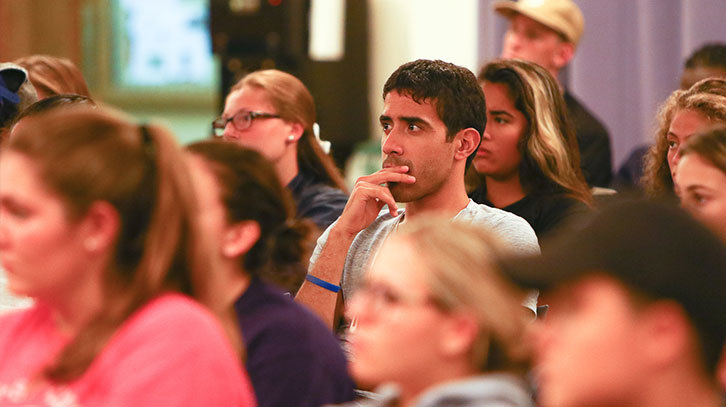Doctors in the emergency room told Scott Maloney’s parents to say goodbye.
“How messed up is that?” said Maloney, pacing the Tuohy Hall Auditorium stage and recounting the alcohol-related accident that temporarily left him legally brain dead and landed him in a coma for 23 days in 2004.
Maloney, an interactive storyteller and motivational speaker, visited SJC Brooklyn on Sept. 19, a day after the 12th anniversary of the drunken slip on a roof that nearly killed him.
“I want everyone to close their eyes,” Maloney instructed the room, the majority of which comprised SJC student athletes. “Hold up both of your hands. Now keep them raised if you know someone who was killed or injured in an accident involving alcohol. Keep your hands up, and open your eyes.”
Maloney looked hardly surprised that nearly everyone in the audience had kept their hands skyward. According to the National Institute on Alcohol Abuse and Alcoholism, 1,825 college students between the ages of 18 and 24 die from alcohol-related unintentional injuries every year. On Sept. 18, 2004, Maloney nearly found himself included in that statistic.
Returning from a night of drinking, Maloney realized he’d locked himself out of his third-story dormitory room at Becker College in Worcester, Mass. Instead of alerting campus security, he made an impaired decision that changed his life forever: He decided to crawl through the dorm’s hallway window, climb onto a tree branch, and shimmy over to his room’s window — 30 feet above the ground.
“Seconds into my stunt, I felt the slippery surface begin to lose its traction,” Maloney said. “I fell. Landed on my head. That’s where the story almost ends.”
Rushed to the emergency room and pronounced brain dead, Maloney lay in a hospital bed as his parents were told by doctors bid farewell to their son. Miraculously, Maloney clung to life. He endured a 23-day coma and repeated surgeries — including a decompressive craniectomy, a procedure in which part of the skull is removed to allow a swelling brain room to expand without being squeezed.
Once-captain of his college’s cross-country team, Maloney was now a victim of a traumatic brain injury (TBI). The years ahead required intensive physical therapy and speech-language therapy. He had to learn again how to use his arms and legs, as well as the ability to speak.
“Repeat after me,” Maloney said, articulate and clear, hardly showing any lingering effects of the head injury that left him legally brain dead. “I cannot change the past. But I can change my future.”
Maloney urged those SJC students in attendance to make healthy decisions and not to be influenced by peer pressure, especially when dealing with alcohol. While those words are all-too-often heard and forgotten by college-age students, it was visible in the faces within Tuohy Hall that hearing them from Maloney had made a significant impact.
“My experience listening to Scott was very eye opening and quite surprising,” said Alec Willis, a junior and captain on the men’s basketball team. “I expected the usual lecture about the dangers of drinking and driving. However, his story was different … It was very moving, and I have grown from the experience to have a new-found perspective on some of the other dangers of irresponsible drinking, while also understanding the importance of family in times of distress and need.”





1 comment
Please let me know if you are interested in having Scott Maloney or another motivational speaker come to your school. I would like to set this up. Thanks!